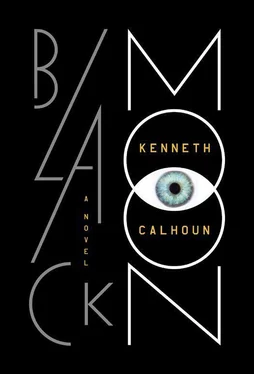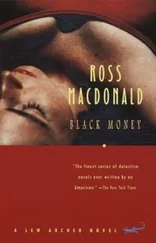Chase could hear him in there now, beyond their view in the tunnel, grunting as his shovel, or maybe a pickax, hacked at the wall of dirt in the darkness.
“What’s that?” he said, pointing to a dark stack of something, maybe firewood, against the wall. Macy had not turned on the lights, so the room was dim. Wells had ordered her to keep it off at all times, she told him, since it made the light in the earth harder to see.
“Bones,” she said. “He keeps bringing them up. Rollins says they are buffalo bones, that he must have hit an old Indian dump site.”
Chase went in for a closer look. Yes, they were like dumbbells.
“Wells thinks it’s an extinct animal, a deformed beast that no one has ever seen,” Macy said. “He probably hasn’t slept in almost three weeks.”
Wells could not confirm this when he finally appeared and Macy led him to the table. He was too far gone, holding his spoon in his fist like a caveman. His knuckles were scraped and the soup Macy gave him was soaking his beard. He stared just beyond Chase’s shoulder as Chase talked, telling them both how he and Jordan had come up from California, how they had enough serious meds to get them through this, and they were willing to share, for a price. Wells didn’t seem to grasp any of this.
Macy tried to explain. “He’s saying it’s an epidemic, Wells. That other people have it and it’s going to get worse for all of us.”
Wells said, “A long time before I stopped then too. I came up on the ridge with rainbows slapping on a string at my leg and lightning had killed a bear like a grave mound with smoke in its fur and the eyes like hard-boiled eggs. There was another eye in the hole staring up at me and I couldn’t sleep for weeks and weeks after I saw it down there big as a softball I thought oh a puddle until it blinked.”
Macy grabbed Wells’s hand. She said, “I thought you couldn’t sleep because you were thinking about me. But it turns out it’s something else. So much for romance.”
Wells looked at her as if she had just spoken in some alien tongue.
It was difficult for Chase to get up from the table without putting his anatomy on display. He was sure Macy caught sight of it, but he almost didn’t care. He told her where she could find him. “We’re willing to share,” he said again. “But not for money. It has to be something that has value after all of this is gone.”
He hoped that wasn’t too direct, yet just direct enough.
10

FELICIA WAS SEEING THINGS – CHASE, FOR example. First, out on the deck, staring at the indifferent ocean, shirtless and skinny. Then a glimpse of him sitting at the edge of her bed, head bowed as if reading something in his lap. Or she could just hear him peeing in the bathroom, his little allergy cough revealing his identity and disrupting the noisy stream.
She saw her mother and her orthodontist down on the beach, peering into the tide pools and strolling at the edge of the water, their footprints fading behind them in the silvery gloss. A pelican too, with a laugh identical to the horsy guffaw of her childhood piano teacher. It sat on the railing no more than three feet away, winking at her as if they shared a scandalous secret.
It was worse for some, since they all had succumbed to the symptoms and progressed through the phenomenon, as the researchers insisted on calling it, at different rates. There were people in the Sleep Research Center talking to shadows and others who were only now starting to slur their words. The doctors—Kitov, Lee, Porter—were showing signs but not publicly admitting to it. Porter appeared to be the furthest gone, but maybe that was just because Kitov and Lee were generally harder to read. Even before the sleeplessness hit, the old goat-faced genius Kitov had rambled nearly incoherently, peppering his speech with Russian and shuffling down the laminated corridors not unlike the insomniacs on the streets.
Meanwhile Lee had largely persisted with his robotic demeanor, at least in public, though Felicia thought she had heard him scrambling his grammar at the last morning meeting. Then again, she was also hearing strains of music emanating from the ocean, as though a sea monster were playing a giant cello just beyond the continental shelf.
Whatever they were going to do, these researchers, they had better do it quick. This implant scheme of theirs. They had briefed everyone. A wire in the head. It sounded like a workable plan, until the Q&A, when Warren—one of several grad students who had gravitated to the lab to work with the famous Soviet-era exile—pointed out that none of them were surgeons, let alone neurosurgeons.
“Is not exactly brain surgery,” Dr. Kitov tried—the joke being that it was. “But serious,” he insisted, “is not so complicated. Two holes drilled in skull, electrode leads threaded into brain, then wired up to stimulator that is put under skin, here in chest.”
Dr. Porter, now like an angry drunk from lack of sleep, took a swipe at the principal investigator. “Maybe when we’re in there, we should go ahead and stimulate the place where fucking articles are stored.”
Felicia, and the handful of others still operating within a framework of cultural norms, felt obligated to laugh in an attempt to undermine Porter’s weird venom. But it was a losing battle, this effort to uphold manners—let alone common decency—in the face of the ravaging epidemic. Emotions were raw, nerves exposed by exhaustion, and the morning meetings, lunches, gatherings of any kind were becoming increasingly hostile and unpredictable.
The irony of their situation inflamed matters. After all, here they were, the staff of one of the world’s most famous sleep research facilities, and they were just as clueless as anyone else. Much of the anger and disappointment was directed at Kitov, since he was the world-renowned expert in the field of sleep and insomnia who had drawn millions in grants to the university over the years yet claimed to be completely blindsided by the phenomenon.
“It is,” he proclaimed, “attack on cathedral of human mind, perhaps of alien origin.”
His eccentricities were no longer endearing quirks in the eyes of the sleep center inhabitants—a group of two dozen researchers, lab techs, undergrad assistants, and a small security team. Instead, his slightly askew worldview, along with his attempts at humor, was seen as a diversion, drawing the eye away from his incompetence. People had begun to look to Dr. Lee, but he deferred to his master, publicly supporting Kitov’s implant scheme. Indeed, he had indicated to Felicia that he thought this mechanical fix was their only hope at this point.
FOR a while, before the meds stopped working, they had had to separate the sleepers from the sleepless and security was an issue. Now no one was sleeping so there was no need for lockdown. People strolled the hallways at all hours, some verbalizing their delusions in mangled sentences or crashing into the walls on wobbly legs. Felicia felt compelled to guide her fellow residents safely through the labyrinth of corridors, to be useful while she still possessed the presence of mind to navigate the center. They, in return, projected their visions upon her.
Some were subtle, but telling, mix-ups, such as when Porter addressed her as Felina. In his confusion, a tech named Miles called her Terry—the name of his sister, she knew. She gently corrected him as she nursed a cut on his nose, after he had walked into one of the glass doors. He peered into her face as if trying to make sense of the details.
When her friend Francine emerged naked from her room, Felicia took her by the arm and reversed her course. Francine called her Mommy as she helped her step into a skirt. They both laughed about it, before Francine collapsed into sobs.
Читать дальше













